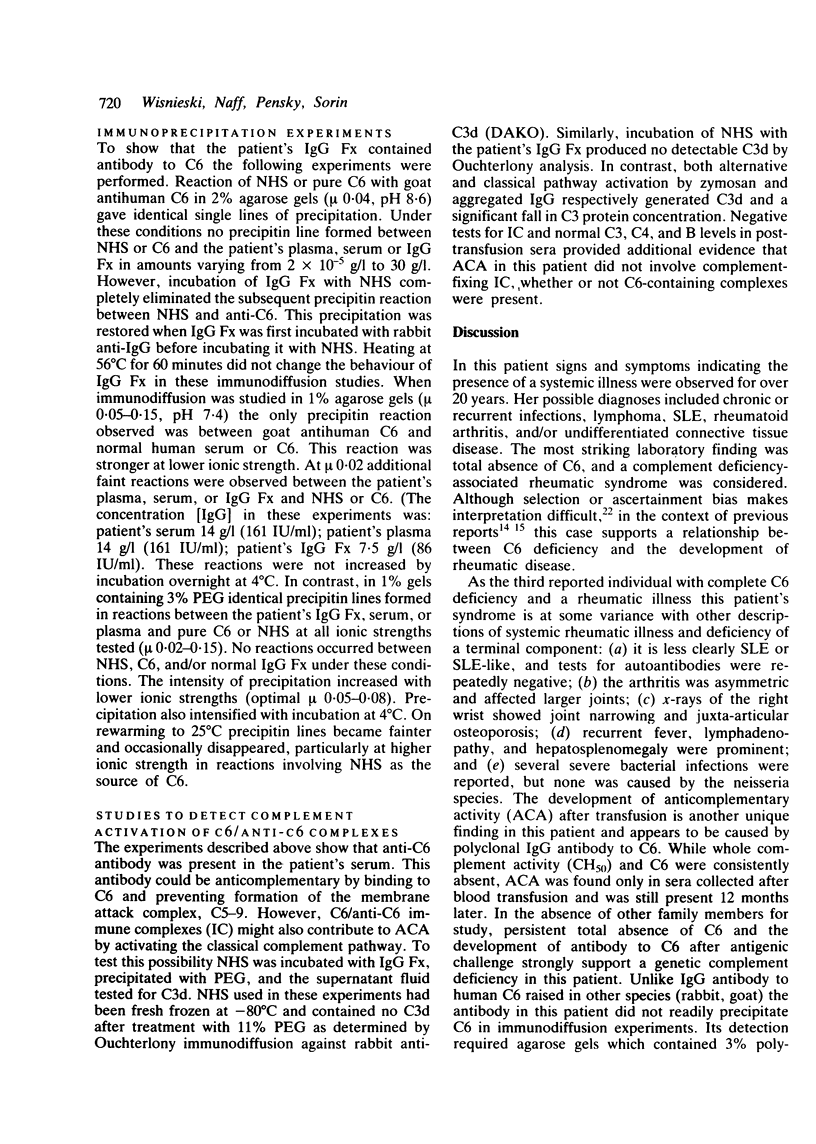Abstract
Hereditary deficiencies of early complement components have usually been associated with the development of rheumatic diseases like systemic lupus erythematosus (SLE), while terminal component deficiency is well known to predispose to recurrent neisserial infection. In contrast, only recently have patients been reported with rheumatic disease and hereditary deficiency of a terminal component. The clinical syndrome in these patients has been characterised as 'SLE-like'. We describe here a third patient with complete C6 deficiency and a systemic rheumatic illness characterised by fever, anaemia, lymphadenopathy, hepatosplenomegaly, episcleritis, and asymmetric arthritis. After blood transfusion her serum became anticomplementary; IgG antibody to human C6 was found to be the cause of anticomplement activity. Persistent absence of C6 in this patient and production of anti-C6 antibody after antigenic challenge indicate hereditary C6 deficiency. This case supports an association between hereditary deficiency of a terminal complement protein and the development of systemic rheumatic disease.
Full text
PDF






Selected References
These references are in PubMed. This may not be the complete list of references from this article.
- Agnello V. Complement deficiency states. Medicine (Baltimore) 1978 Jan;57(1):1–23. doi: 10.1097/00005792-197801000-00001. [DOI] [PubMed] [Google Scholar]
- Fearon D. T., Wong W. W. Complement ligand-receptor interactions that mediate biological responses. Annu Rev Immunol. 1983;1:243–271. doi: 10.1146/annurev.iy.01.040183.001331. [DOI] [PubMed] [Google Scholar]
- Lim D., Gewurz A., Lint T. F., Ghaze M., Sepheri B., Gewurz H. Absence of the sixth component of complement in a patient with repeated episodes of meningococcal meningitis. J Pediatr. 1976 Jul;89(1):42–47. doi: 10.1016/s0022-3476(76)80924-9. [DOI] [PubMed] [Google Scholar]
- Naff G. B., Byers P. H. Complement as a mediator of inflammation in acute gouty arthritis. I. Studies on the reaction between human serum complement and sodium urate crystals. J Lab Clin Med. 1973 May;81(5):747–760. [PubMed] [Google Scholar]
- Petersen B. H., Graham J. A., Brooks G. F. Human deficiency of the eighth component of complement. The requirement of C8 for serum Neisseria gonorrhoeae bactericidal activity. J Clin Invest. 1976 Feb;57(2):283–290. doi: 10.1172/JCI108279. [DOI] [PMC free article] [PubMed] [Google Scholar]
- Tedesco F., Silvani C. M., Agelli M., Giovanetti A. M., Bombardieri S. A lupus-like syndrome in a patient with deficiency of the sixth component of complement. Arthritis Rheum. 1981 Nov;24(11):1438–1440. doi: 10.1002/art.1780241119. [DOI] [PubMed] [Google Scholar]
- Walport M. J., Black C. M., Batchelor J. R. The immunogenetics of SLE. Clin Rheum Dis. 1982 Apr;8(1):3–21. [PubMed] [Google Scholar]
- Zeitz H. J., Miller G. W., Lint T. F., Ali M. A., Gewurz H. Deficiency of C7 with systemic lupus erythematosus: solubilization of immune complexes in complement-deficient sera. Arthritis Rheum. 1981 Jan;24(1):87–93. doi: 10.1002/art.1780240114. [DOI] [PubMed] [Google Scholar]
- Zubler R. H., Lange G., Lambert P. H., Miescher P. A. Detection of immune complexes in unheated sera by modified 125I-Clq binding test. Effect of heating on the binding of Clq by immune complexes and application of the test to systemic lupus erythematosus. J Immunol. 1976 Jan;116(1):232–235. [PubMed] [Google Scholar]


